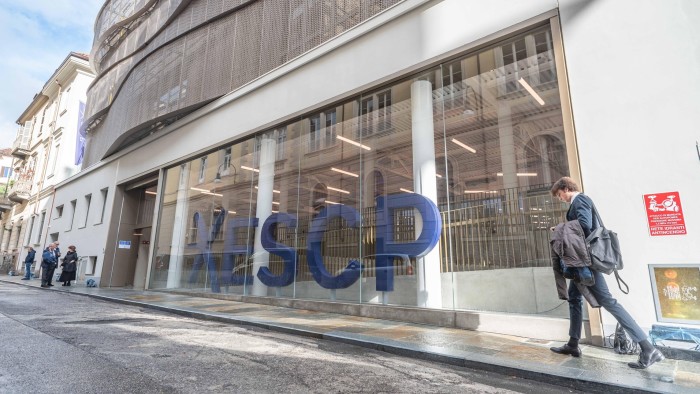Unlock the Editor’s Digest for free
Roula Khalaf, Editor of the FT, selects her favourite stories in this weekly newsletter.
European business schools led by ESCP performed most strongly in the FT’s latest annual ranking of masters in finance courses, with rising competition from several of their Chinese rivals.
Skema, Essec and HEC Paris in France are also among the top five schools, alongside Tsinghua University School of Economics and Management in Beijing, whose alumni also claim the highest average salaries when adjusted for international purchasing power parity, followed by Peking University: Guanghua and Shanghai Advanced Institute of Finance at SJTU.
The FT ranking of pre-professional finance masters programmes offered by 70 schools, all of which are accredited, uses data provided by the institutions and their alumni three years after completing their courses. It is weighted according to categories including salary, job progression and careers service.
In an indication of a more difficult job market for finance graduates, average reported salaries for alumni across the ranked programmes declined by nearly 4 per cent to $90,254 this year after rising over the past four years to a peak of $93,737 in 2024.
FT Masters in Finance ranking 2025

See the ranking of the top 70 pre-experience finance degrees
A separate survey last year by the Graduate Management Admission Council, which administers the GMAT test, revealed that just over half of business schools reported a growth in applications for financial masters while 42 per cent showed a decline and 6 per cent indicated stagnation.
However, some institutions remain confident of future growth, including Iese Business School in Spain, which will launch its inaugural programme in September 2026. Marc Badia, deputy dean, says this is a response to research it conducted showing a rising share of chief executives and other top managers who had previously held financial roles. “The function of chief financial officer has changed over time. It is now much more strategic.”
There have been mixed signs in demand for other financial qualifications, including the CFA Institute qualification for investment professionals. Rob Langrick, chief product advocate, says there is “mid single digit growth” from industrialised countries, with about 100,000 applicants in the most recent fiscal year globally.
He says overall demand is down from a peak of nearly 150,000 starting to study for the qualification in 2019, since when many Chinese students — who make up a large share of the total — have increasingly switched from interest in careers in finance to science, technology, engineering and maths.
The most popular careers for masters in finance alumni surveyed by the FT are in investment banking and consulting, followed by private equity, asset management and private banking. Fewer than 3 per cent work in accounting.
Half of the cohort undertook an internship as part of their programme, and those who did earned more three years later, with an average salary difference of 27 per cent — more than $21,000. For the second consecutive year, graduates with work experience as part of their course earned more than $100,000.

ESCP, with six campuses across Europe, ranked top for its alumni network and career service. The school also performed well for international course experience and career progression and its alumni had the fifth highest average salary at $175,880. Skema was ranked top for career progress, international course experience and environmental, social and governance teaching.
HEC Paris, in fifth place overall, was ranked top for international mobility, based on alumni citizenship and the locations where they worked before studying for their masters, on course completion and three years after. Their alumni earn the fourth highest average salary at $176,505.
Just two of the 70 ranked schools — Skema and Audencia — reported gender parity among students, while another six had more women than men, with a peak of 58 per cent female participants at SGH Warsaw School of Economics. The rest had more male students, with just 16 per cent women at WHU — Otto Beisheim School of Management.
Three schools, all French, had gender parity among faculty: Neoma Business School, Iéseg School of Management and Skema. Only four had more women than men, with a low of 24 per cent female faculty at Frankfurt School of Finance and Management.
Among schools producing publicly available reports on their carbon emissions and with stronger net zero targets, Bocconi in Milan scored highest, followed by BI Norwegian Business School in Oslo and IE Business School in Madrid.
The quality of teaching of corporate finance, investments and equities received high scores from respondents as they reflected on insights that proved useful in their careers. They gave lower marks to courses on compliance, commodities and fintech.
The vast majority of graduates identified enhanced career opportunities and higher earning potential as their primary reasons for enrolling on a masters in finance degrees. They expressed less interest in working internationally or becoming entrepreneurs.
The FT did not rank post-professional masters in finance courses this year, because too few schools met the eligibility criteria.







